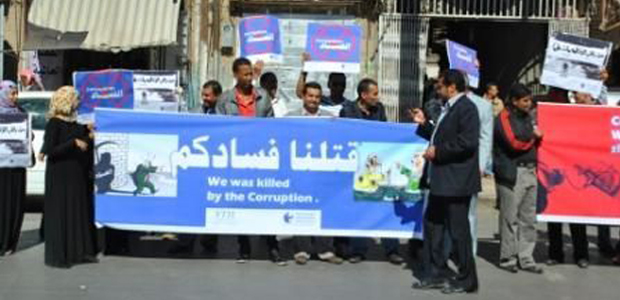Yemenis of all stripes took to the streets in early 2011 demanding change, especially not to let corruption continue unabated.
In November 2011, the protestors succeeded in ousting Ali Abdullah Saleh,Yemen’s president for over 30 years, and ushering in a new era of democratic hope.
Since then, governmental agencies, parliamentary committees, media associations, NGOs and youth groups have tried to fight corruption.
However, the average citizen has not yet felt any tangible benefits. Corruption continues and its roots run deep.
Dr. Yasin Said Numan, a Yemeni public intellectual and general secretary of the Yemeni socialist party, described the change:
old corruption used to tear away at society behind closed doors with politeness and discretion but new corruption is vulgar and unabashedly immodest
How does corruption affect Yemen, 21 places from the bottom of the Corruption Perceptions Index 2012?

YTTI Demonstration in Sanaa on International Anticorruption Day 2012 calling for
stolen assets of corrupt leaders to be frozen
Corruption in Yemen ranges from financial and administrative, to the petty. We see money given to policemen to let traffic flow or to government employees to process paperwork that is their job to do anyway. We can even see it in in the personal contacts and favours that are given to certain people to move ahead in life. These acts, too, constitute corruption where official power is abused.
The revolution that started in 11 February 2011 changed our expectations. For the first time we were able to talk with bravery about corruption cases of prominent public officials.
Yet, several factors account for the failure in achieving our revolutionary goals. Public complaints and cases against corrupt politicians and businessmen mount up in locked drawers without any tangible follow-up or convictions.
Corrupt officials have benefited after the revolution by going after journalists who expose corruption with defamation law suits. For example, earlier this month the Specialized Press and Publications court found a Yemeni daily Al Oula guilty on defamation charges for an article it published on corruption it found in the Supreme Commission for elections and referendum. In many cases the journalists who exposed incidents of corruption lacking hard evidence ultimately end up losing these cases.
In the past year, YTTI has taken an active role in promoting journalistic ethics and social media usage when exposing corrupt individuals.
While, it is true that unsubstantiated accusations undermine the fight against corruption and may benefit the corrupt, if we had real access to public information we would have hard evidence and solid facts needed in our work to fight corruption.
Carousel image: Creative Commons, Flickr/ asterix611















 Connect with us on Facebook
Connect with us on Facebook Follow us on Twitter
Follow us on Twitter